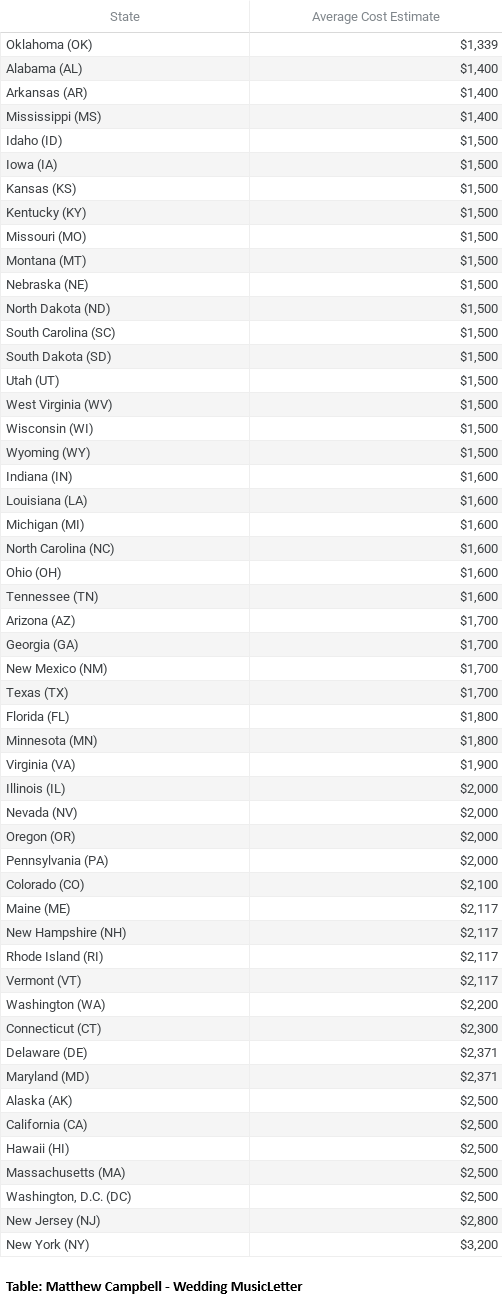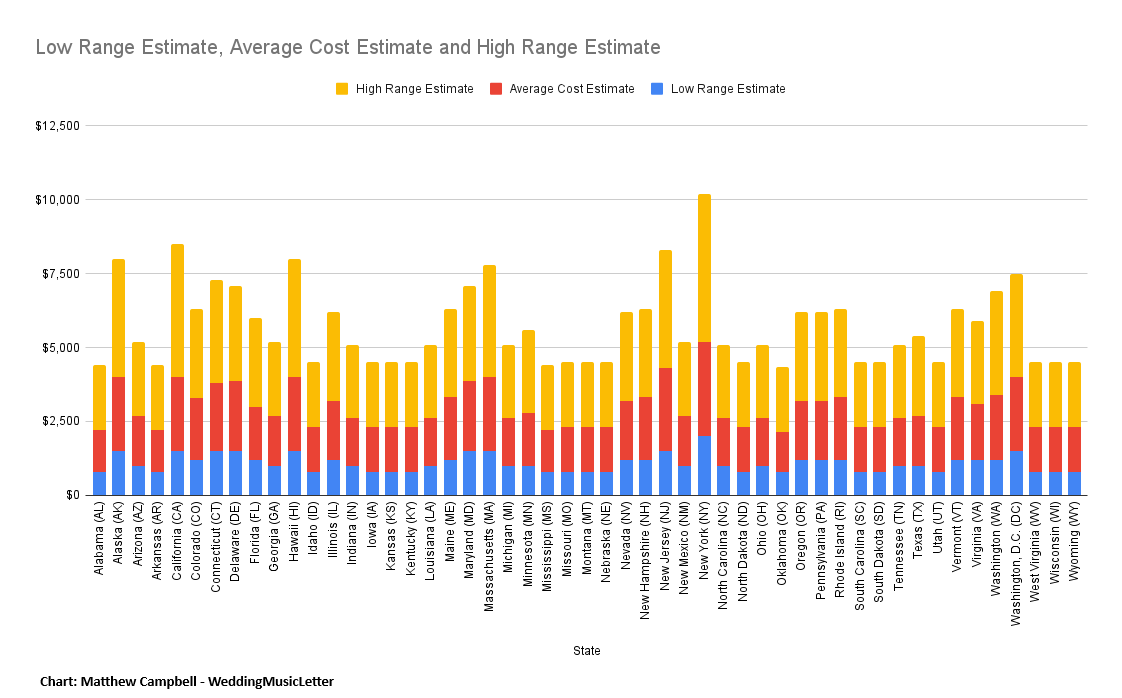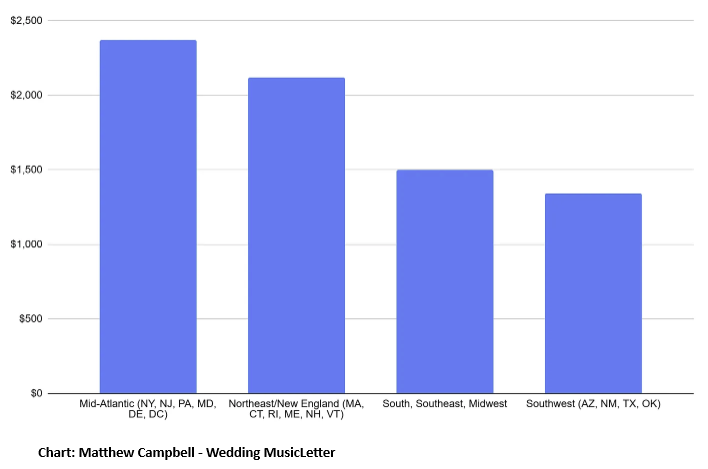🎵 What Is The Price to Hire a Wedding DJ?
A comprehensive breakdown of professional wedding DJ pricing.
Table of Contents:
Sourcing Reliable Pricing Data
What Typically Makes Up The Cost of a Wedding DJ
The Data
The Investment
The Path to Profit
Join the Conversation
What does a wedding DJ cost?
The average cost for a professional wedding DJ in the U.S. typically ranges from $1,000 to $2,500.
Well, I could send tens of thousands of requests for wedding quotes to DJs in the USA. You guessed it. That’s not gonna happen.
Sourcing Reliable Pricing Data
Since no single, regularly published source provides comprehensive national DJ pricing, the data in this analysis were synthesized from thousands of data points, including public pricing on major vendor platforms (The Knot, WeddingWire), regional studies, and proprietary metropolitan benchmarks.
While this compilation doesn’t replace hyper-local pricing research, it provides the most accurate professional benchmark available for industry veterans and beginners to evaluate and position their services.
What Typically Makes Up The Cost of a Wedding DJ
1. Experience and Expertise (The Talent Factor)
Tiered Pricing: A new DJ or a large multi-op company may offer lower rates ($500–$1,000), while a highly-experienced, veteran, or niche freelance DJ with a strong reputation and 5+ years of experience will command a premium ($1,500–$4,000+).
Reputation and Reviews: Highly-rated vendors (often with 100+ positive reviews) are priced higher due to proven reliability, superior mixing, and masterful MC/coordination skills.
The MC Skill Set: A DJ who is also a polished Master of Ceremonies (MC), a coordinator, speaker, and energy manager demands a higher fee. The MC is valued higher than one who simply presses play or mixes extremely well.
2. Duration and Scope of Service (Time)
The amount of time the DJ is committed to your wedding is a fundamental cost driver. This includes:
Performance Hours: The actual time the DJ is playing music and hosting (e.g., a 4- to 6-hour reception). Overtime beyond the contracted hours is almost always an additional, often higher, hourly fee. Also know that some DJs have a standard fee and you have them “for the day”.
Total Coverage: Many couples need music for more than just the reception. Adding coverage for a ceremony, cocktail hour, or an after-party requires extra equipment and time, which commonly increases the total cost.
Prep and Logistics: The fee covers many hours of work before the event that couples rarely see, including:
Consultations and planning meetings.
Curating, downloading, and editing custom playlists and special requests (like first dance edits).
Loading, traveling, setting up, sound checking, breaking down, and unloading equipment.
3. Equipment and Technical Requirements
A professional DJ’s fee reflects the significant investment they make in reliable, high-quality gear.
Sound System: The cost of professional-grade speakers, subwoofers, amplifiers, a DJ booth, and mixers is built into the price. Larger venues or high guest counts may require a larger, more powerful, or additional sound system.
Multiple Setups: If the ceremony, cocktail hour, and reception are in different areas of the venue, the DJ needs to provide, set up, and manage multiple sound systems, increasing the equipment and labor costs.
Microphones: High-quality wireless microphones for speeches, toasts, and the officiant and couple (for the ceremony) are included in the overall equipment cost.
Backup Gear: Reputable DJs factor in the cost of owning and maintaining backup equipment to ensure a seamless experience, even in the event of a failure.
4. Location and Date (Logistics)
Where and when the wedding takes place can significantly impact the final price.
Geographic Region: DJs in major metropolitan areas, high-cost-of-living cities, or popular wedding destinations often charge more due to higher operating costs and demand.
Travel Fees: If the venue is outside of the DJ’s standard service area, they will charge a travel fee to cover mileage, gas, vehicle wear, and additional time spent traveling.
Event Date: The most expensive day for a wedding DJ is typically a Saturday during peak season (e.g., June, September, October). Off-peak months (January-March) or weekday weddings often come with lower rates.
5. Additional Services and Production
Many DJs offer optional add-ons that enhance the event, which are priced separately. While some DJs include these add-ons in their pricing.
Lighting Production: Basic dance floor lighting may be included, but more elaborate options will increase the cost:
Uplighting for the room.
Custom Gobo/Monogram lighting.
Pin-spot lighting for first dances.
MC Services: While a DJ is generally expected to make basic announcements, a skilled Master of Ceremonies (MC) who actively guides the event, manages the timeline, and engages the crowd will command a higher rate.
Special Effects: Services like photo booths, dry ice machines for “Dancing on a Cloud” effects, CO2 canons, or video screens/projections are often offered as premium package upgrades.
Bilingual Skills: A DJ who is fluent and comfortable running an event in two languages (e.g., English and Spanish) may charge a premium for that specialized skill set and for the knowledge of organizing multiple cultures.
6. Business and Operational Costs (Overhead)
Finally, a portion of the fee covers the necessary expenses of running a professional, legitimate business.
Liability Insurance (A Venue Requirement): DJ’s fee includes mandatory commercial liability insurance (often $1M policy). This is a non-negotiable cost that protects the couple and the venue, and its presence separates a professional from an amateur.
Music Licensing: DJs need to legally acquire and maintain a massive, high-quality music library. I will also include DJ music management software and DJ music pools.
Taxes and Fees: Business licenses, taxes, and merchant fees for processing credit card payments are factored into the pricing.
Marketing and Administration: Costs associated with office rent, website maintenance, marketing, and general administrative work.
The Data
Since a single, regularly published source for all 50 states with exact high/low/average costs is not publicly available, the figures below are synthesized from national wedding industry reports (like The Knot and WeddingWire), regional averages, and major metropolitan area benchmarks.
Note: The prices represent the typical cost for a professional wedding DJ offering a 4 to 6-hour reception package, including basic sound equipment and MC services. Costs can vary significantly based on DJ experience, package additions (lighting, ceremony sound, photo booths), and specific city/venue demand.
This is a comprehensive table detailing the estimated wedding DJ costs across all 50 states, plus Washington D.C.
Estimated Average Cost of a DJ by State
Sorted from lowest to highest.
Estimated High, Low, and Average Cost of a DJ by State
This chart shows the common starting point cost for hiring a DJ.
This chart shows the common high-end cost for hiring a DJ.
The Knot’s Real Weddings Study reports an average of $1,689 for a wedding DJ nationwide. (Source)
The most significant factor in DJ cost is location, which can be broken down into regional averages (sourced from major wedding studies):
The Mid-Atlantic region has the highest wedding DJ costs at $2,371
Northeast/New England is at $2,117
The South, Southwest, Southeast, and Midwest regions range between $1,300 and $1,700.
To illustrate the geographic variance: a 6-hour package in a high-cost area like Manhattan, NY, may average $2,250+, whereas a similar package in Milwaukee, WI, might average $1,450.
Putting DJ Cost in Perspective
Budget Allocation: Industry experts suggest allocating $1,300 to $1,900 for wedding entertainment, which is typically 5%-8% of the total wedding budget.
The Value of Entertainment: Music and the DJ’s coordination have a disproportionately large impact on guest experience compared to other wedding professionals.
The Investment
Shifting from Price to Professional Value
Consider these actionable, DJ-focused takeaways:
Own Your Tier: If your pricing is in the high range, be prepared to justify it with superior operational excellence (insurance, backup equipment, full-service MC skills) and a well-defined personal brand. The consumer sees a high price tag; the professional offers a low-risk, high-value solution.
The Profit in Overhead: The “Operational Costs” I outlined are often the biggest differentiator. Factors like liability insurance, music licensing, and quality music management software are not expenses; they are the barriers to entry that keep amateurs out and allow you to command a professional rate.
Location as a Strategy: Use the regional data to benchmark your pricing correctly. If you are positioned between two markets (e.g., a major metro and a smaller city), you can strategically adjust your travel fees and package minimums to capture the higher-end client without over-saturating your local, lower-cost market.
Package for Profit: Review your current packages against the cost breakdown. Are you charging enough to cover the hidden costs of multiple setups? Is your overtime rate priced high enough ($150–$350/hour) to discourage last-minute changes while fully compensating your time?
The cost of a wedding DJ is not simply the summation of gear and hours. It is the monetary value of a seamless, expert-led experience. Your fee represents the total financial and time investment required to deliver that peace of mind.
The Path to Profit
Scaling Your Expertise
The data presented confirms a widening gap between the high and low-end markets. For the established DJ, the challenge is not just raising rates but strategically scaling operations, either as a premium solo-op or a successful multi-op company.
A Key Multi-Op Pricing Principle: For owners of multi-op (multi-operator) companies, one of the most common pitfalls is allowing a lower-priced associate DJ to undercut the value of the brand. Your brand’s reputation is the guarantee of quality, backup, and professionalism - the commodity. Never price a junior DJ so low that it signals to the market that your full-price senior DJ is overvalued. The cost difference should reflect a predictable variation in experience and demand, not a dramatic difference in operational quality or risk to the client.
Forward-Looking Challenge: The Live-Hybrid Threat The fastest-growing, high-end entertainment package involves a DJ paired with live musicians (saxophonists, drummers, electric violinists). This hybrid model is commanding premium rates (often $4,000 to $8,000+). Are you positioning your services to compete with this integrated entertainment model, or are you collaborating with musicians to share in this growing, high-margin market?
Join the Conversation
The Wedding Musicletter is dedicated to elevating the professional standards of the wedding entertainment industry.
I invite you to share your insights:
Did your average package price fall within your state’s estimated high/low range?
Which single factor (e.g., MC ability, lighting, or the number of setups) has allowed you to increase your pricing the most?
Contribute your expertise!
Thanks for reading!
Matthew Campbell
Wedding MusicLetter








Matt, this is a comprehensive and valuable study! I’m glad to see New Jersey towards the top of the pricing charts. Services that have contributed to our multi op commanding a higher average price point include musician, fusion packages, uplighting, and Photo Booths in particular. As a multi op owner, I’ve avoided tiered pricing. It’s potentially problematic to book DJs who are less skilled/experienced at lower prices, connoting that the service quality will be inferior.